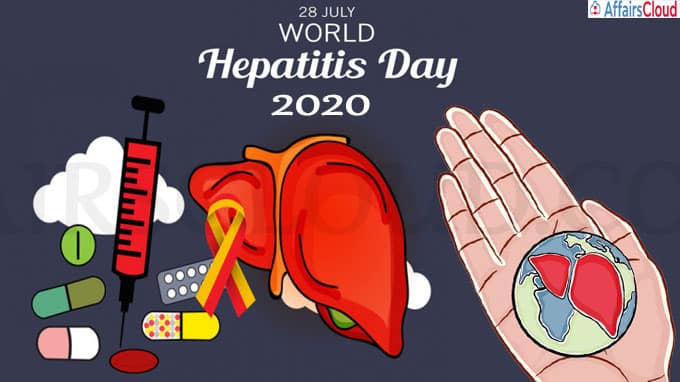 World Health Organisations (WHOs) World Hepatitis Day is annually observed on 28th July to encourage the national and international efforts towards hepatitis and to educate the individuals and general public about the need for global response outlined by WHOs Global hepatitis report 2017.The first World Hepatitis Day was observed on 28th July 2011.
World Health Organisations (WHOs) World Hepatitis Day is annually observed on 28th July to encourage the national and international efforts towards hepatitis and to educate the individuals and general public about the need for global response outlined by WHOs Global hepatitis report 2017.The first World Hepatitis Day was observed on 28th July 2011.
The theme of 2020 World Hepatitis Day is “Hepatitis-free future” focusing on prevention of Hepatitis B among mothers and newborns.
World Hepatitis Alliance (WHA)’s theme for World Hepatitis Day 2020 is “Find the missing millions”.
Background:
i.The World Health Organisation (WHO) declared 28th July as the World Hepatitis Day in 2011 to create awareness about the diseases caused by viral hepatitis, an inflammation of the liver causing various health problems like liver cancer etc.
ii.The 28th of July was chosen to honour the birth anniversary of Nobel Laureate Dr.Baruch Blumberg, who discovered the hepatitis B virus(HBV) and developed the diagnostic test and vaccine for HBV.
iii.The World Hepatitis Day was first celebrated by World Hepatitis Alliance (WHA) in 2008.
2020 Events:
i.WHO launches the new recommendations for the prevention of mother to child transmission of the hepatitis B virus(HBV).
ii.WHO organised a webinar high level global talk show: Towards a “Hepatitis Free Future” on 28th July 2020, to discuss the progress towards the elimination of viral hepatitis as a public health threat.
2020 Events in India:
i.Om Birla, Speaker of Lok Sabha inaugurated the 2nd Empathy e-Conclave organised by the Institute of Liver and Biliary Science(ILBS) in collaboration with the Airport Authority of India (AAI) to create awareness among the parliamentarians on the occasion of World Hepatitis Day.
ii.The theme of 2020 e-Conclave is “Keep your Liver Safe in COVID times”.
iii.The participants of the conclave took the pledge of “Healthy Liver- Healthy India”.
Key People:
Ravi Shankar Prasad, Union Minister of Law and Justice with Dr. Harsh Vardhan, Union Minister of Health and Family Welfare as the guest of honour and Dr. Poonam Khetrapal, Regional Director, SEARO (WHO), Vijay Kumar Dev, Chief Secretary of Delhi, Arvind Singh, Chairman, AAI and other parliamentarians participated over a virtual platform.
Focus of Hepatitis Free Future Campaign:
i.Hepatitis B vaccination of newborns at birth, followed by at least 2 additional doses.
ii.Pregnant women should periodically test for hepatitis B, HIV and syphilis and receive treatment if needed.
iii.Everyone including prisoners, migrants, highly-affected populations etc should have access to hepatitis prevention, testing and treatment services.
iv.Proper testing and treatment will prevent viral hepatitis.
v.Essential hepatitis services should be provided even during pandemic.
Hepatitis:
i.The five main strains of hepatitis virus that causes liver disease are referred to as types A, B, C, D and E, they differ in modes of transmission, severity of illness, geographical distribution and prevention methods.
ii.Mostly the people infected with hepatitis A, B, C, D or E show mild or no symptoms.
iii.Hepatitis D virus (HDV) is found only in people who are infected with HBV and development of chronic HDV is rare.
Key Points:
i.Around 324 million people across the globe are infected with hepatitis B and/or C and for most of the infected people do not have access for testing and treatment of hepatitis.
ii.By 2030 through vaccination, diagnostic tests, medicine and awareness campaigns, around 4.5 million premature deaths due to hepatitis in the low and middle income countries can be prevented.
iii.The global hepatitis strategy of WHO, aims to reduce the hepatitis infection by 90% and deaths due to hepatitis by 65% between 2016 and 2030.
About WHO:
Director General– Dr Tedros Adhanom Ghebreyesus
Headquarters– Geneva, Switzerland




